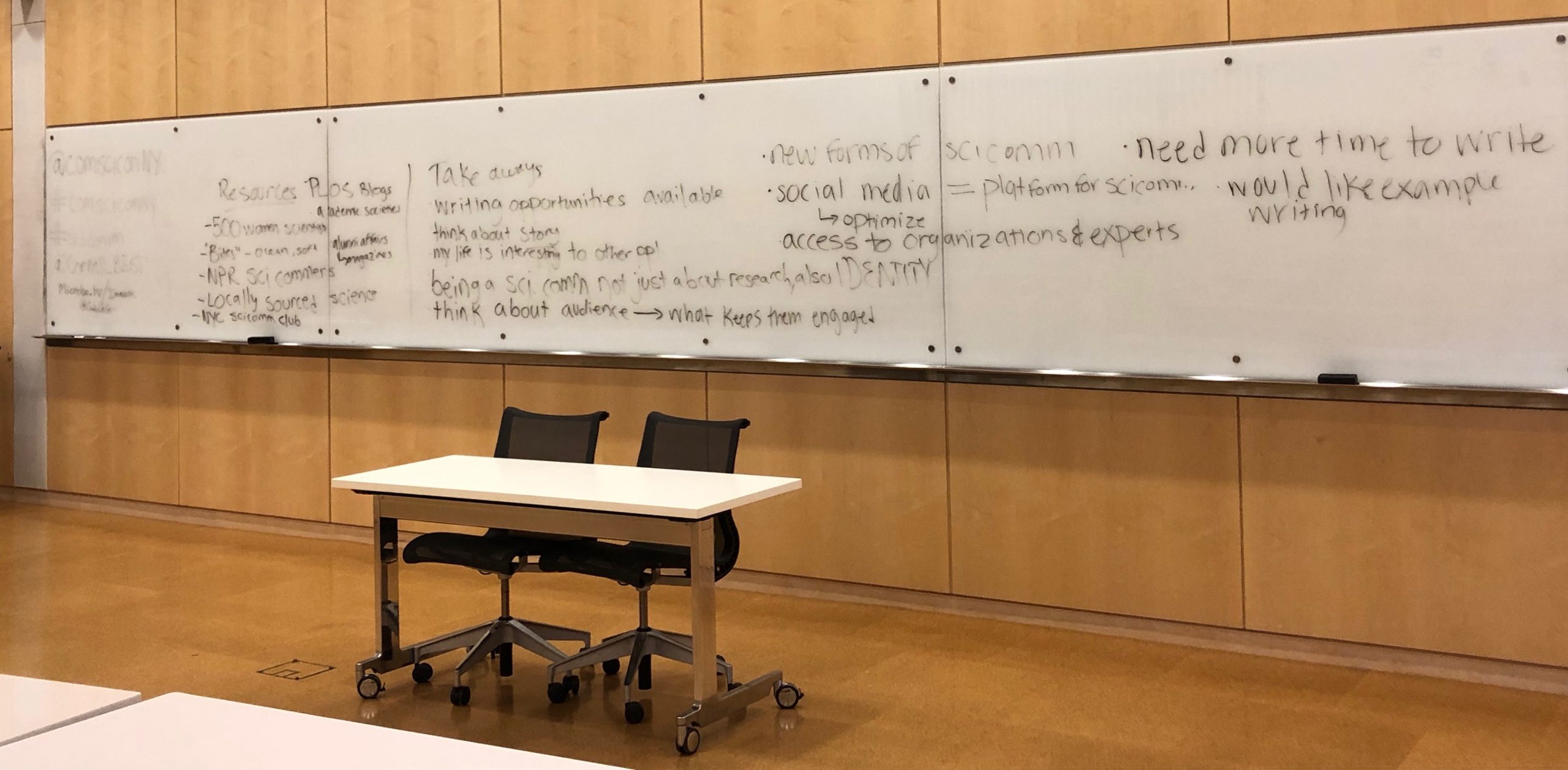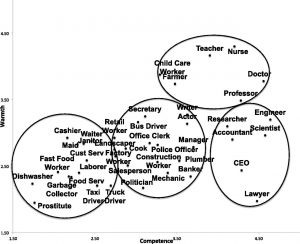ComSciConNY 2019: Competence, warmth, and knowing your audience
Have you ever found yourself listening to an academic lecture peppered with unfamiliar words, feeling a little clueless? God knows I have. I usually cope by sheepishly googling words on my phone, hoping that the speaker doesn’t think I’m on Instagram. Wouldn’t it be nice if instead of feeling like you’re the one at fault, you could throw a big red sign into the air telling the speaker, “Hey! You need to explain that better!”
Just over a week ago, I got to do just that, and it was awesome.
During the first weekend of August, I attended ComSciConNY at Cornell University in Ithaca, New York. ComSciCon is a conference series which was started by Harvard graduate students interested in science communication. At their New York-focused iteration of the program, I was able to meet with other early career researchers who are passionate about sharing science with others, and hone my skills during the event.
The poptalks, for example, challenged us all to explain our research in one minute without the use of jargon. Each attendee was given a green ‘Awesome!’ sign, and a red ‘Jargon!’ sign to display as they saw fit during that minute. It was startling as a speaker to get feedback from the audience in real-time, and even more so when all the signs glared red when you said something too complex. It forced the speaker to re-evaluate themselves, and to acknowledge that they hadn’t been clear. And as an audience member, it reduced the shameful feeling of not knowing something. The exercise was great for forcing yourself to remember how to speak to people in other fields and professions, and I highly recommend giving it a go with friends and colleagues.
I also learned so much from the keynote speaker, Maryam Zaringhalam, PhD, and all the panelists. Below, I share my takeaways from Zaringhalam’s address as well as quick tidbits from the other panelists. Don’t hesitate to get in touch if you’d like to learn more about the other sessions!
Keynote: An effective expert has both competence and warmth
Maryam Zaringhalam, PhD, wears many hats as a Science & Technology Policy Fellow for the NIH, part of the leadership of 500 Women Scientists, and Story Collider podcast producer. Her keynote address was infused with her real experiences of struggles during her PhD at Rockefeller University, and the twists and turns that got her where she is today. This openness was a true example of practicing what you preach, as much of her talk discussed how being our true selves in academia allows scientists to be relatable to wide audiences. When we bring our whole selves to the table, it allows others who can relate to us to see themselves in science. Zaringhalam also drove home the importance of welcoming women, minorities, and marginalized groups into science, as it is imperative to work to counteract years of science/medicine overlooking or outright deceiving these groups. What I will remember most is research she shared on what makes an effective expert from Drs. Susan Fiske and Cydnee Dupree. Essentially, having high levels of both competence and warmth engenders trust with others. Competence with cold behavior ignites envy instead. I highly recommend reading the whole article, but here’s what I found most worthwhile to read:
“…the ambivalently perceived high-competence, low-warmth, “envied” professions: lawyers, chief executive officers, engineers, accountants, scientists, and researchers. They earn respect but not trust. Being seen as competent but cold might not seem problematic until one recalls that communicator credibility requires not just status and expertise (competence) but also trustworthiness (warmth). People report envy and jealousy toward groups in this space. These are mixed emotions that include both admiration and resentment (23, 24). Science communicators arguably need to know about this possible type of response to them.”
(Figure from https://doi.org/10.1073/pnas.1317505111)
Outreach and Extension Panel: Giving science and a voice to diverse populations
This panel focused on the benefits of and best strategies for working in jobs that seek to bring ‘outsiders’ into the university, and extend science to other populations. My quick take here is that we are in an exciting time of outreach, as many universities are starting to revamp and expand programs (often inspired by panelist Jeanne Garbarino PhD.’s work at Rockefeller University). Garbarino recommended partnering with your university’s development office, as they are great at raising funds and in her experience there is often a positive response to directing funds towards outreach/extension. The panelists also drove home the importance of inviting historically marginalized communities into science outreach programs, and that this is an obligation when you are in a position of social power.
Podcast Workshop: Remember that different people categorize information differently.
As a podcast addict, I was particularly excited for this workshop. In my breakout session, I learned about the following resources for podcasters:
- Hindenburg
- Audacity
- Mixcloud
- Bensound
- Zoom recorder (wind protector recommended)
I also enjoyed an exercise in which our instructor gave us each identical sets of photos of comic book characters, and asked us to categorize them. None of us created the exact same bins of characters (ex. Marvel vs. DC, male vs. female, masked vs. unmasked). It was a good reminder that you never know for sure how your audience will process what you say; we must remember that more than likely, the other person does not think exactly the same as you do.
Social Media Panel: Use your target audience as your muse
A theme emerged throughout all of the panels that knowing your audience is essential to effective communication. The social media panelists recommended using your target audience as your muse–what do they care about? How can you contextualize your work into that? It’s a clever way to quickly relate to others.
Science Policy Panel: “Be respectful of someone else’s area of expertise.”
As someone with strong family ties to the NYC area, I had long ago written off science policy as not possible since I didn’t want to move to Washington, D.C. This panel opened my eyes to the possibilities in science policy that exist at state and local levels, and the speakers also shared great general advice for impactful storytelling. Some highlights from what I scribbled down:
- Check out Randy Olsen’s work on the ‘ABT’ system of storytelling, in with the ratio of the words ‘and’ & ‘but’ to the rest of the text predicts narrative strength.
- Multiple panelists bemoaned the use of the phrase ‘dumbing it down.’ Dumbing it down is not the same as making sure people understand you.
- Asking your audience questions, rather than simply telling them things, builds a discussion rather than just talking at someone.
- Being respectful of someone else’s area of expertise is essential, as then you can repackage your expertise so that it is relevant to them.
Storytelling Workshop: Good science has all the elements of a good story.
For the storytelling workshop, I was assigned to a breakout group led by Ella Schwartz. Schwartz juggles cybersecurity work as an engineer with writing fiction and nonfiction STEM books for kids. Schwartz warmly listened to all of our writing aspirations, and firmly told us that writing is about sitting down and doing it. And that really, a scientific story should have all the elements of any story: a beginning, some tension, a climax, and an ending. She also mentioned the following resources which may be of interest to our ECR community:
- Help A Reporter Out: A site where scientists can offer help to reporters seeking scientific expertise.
- Query Tracker: Resource for finding agents to help you with a book idea
Citizen Science Panel: Kids understand complex topics, just don’t always understand complex words.
The last session of the conference covered citizen science, which has come up here in pieces by Jennifer Grigg and Naureen Ghani. What I absolutely loved about this session was the opportunity to hear from middle school science teacher Lucy Madden. I often wonder how science class has evolved since my awkward preteen years. Madden spoke about the implementation of the Next Generation Science Standards, which will move science education to be more inquiry-based over time. She also encouraged us all to sign up for an initiative she started called Letters to a Pre-Scientist, in which scientists can be pen pals to middle schoolers. How cool is that?! She explained that her students can absolutely understand complex science topics, they just don’t necessarily know complex words yet. And that they love to hear that the scientist they are writing with enjoys soccer, hanging out with friends, etc., just like them. Initiatives like this help spread the word that scientists are people too.
Takeaway: Be warm and competent, and get your friends to be too
My only complaint about the conference was that I felt the panelists were preaching to the choir. By nature of being interested in taking a day away from lab to attend a conference about science communication, everyone in the audience was already on board with sharing science broadly. I wish all scientists could be convinced that the sharing of science is imperative to the endeavor. As Sir Mark Walport, former UK Chief Scientist has said, “Science isn’t finished until it is communicated.” How else do we effect change with our work, amongst our peers, our policymakers, or our children? If you care about your work having meaning outside of your lab, I urge you to devote some time to science communication. Keep tabs on the flagship ComSciCon and on franchise events near you. And remember to cut out the jargon!

Featured image taken and provided by the author.

